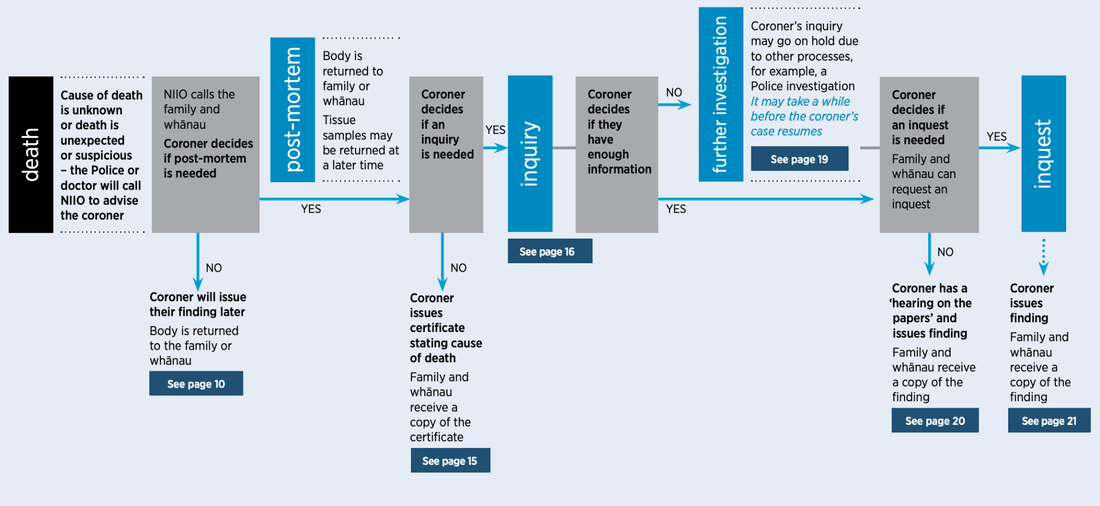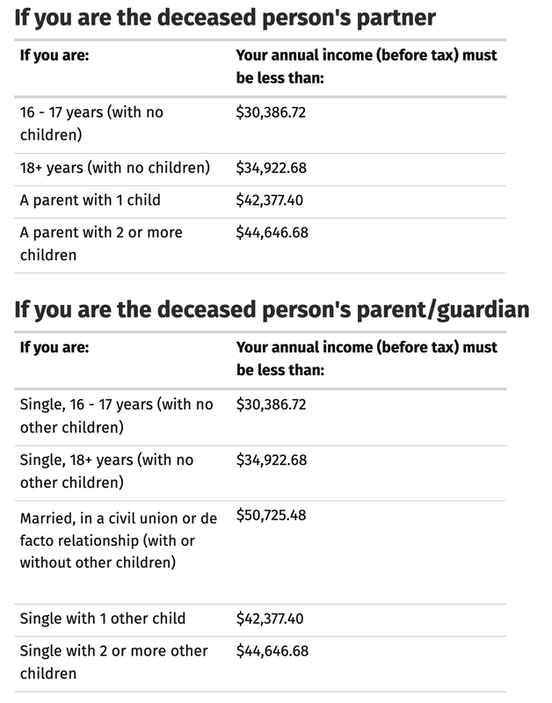Funeral Arrangements – The Definitive New Zealand Guide for Planning
Updated 12 October 2023
Summary:
Our guide covers:
- Most New Zealanders are (understandably) distraught after losing a loved one. The last thing they want to do is deal with time-sensitive funeral processes that are opaque, expensive and unclear. However, most of the time, the responsibility to organise a funeral will fall on the immediate family (as they're almost always closest to the deceased and will know the arrangements they'll likely want to have had).
- For many, the financial aspects of funeral planning can also be a significant burden. While most funerals are notoriously expensive, arranging a respectful and dignified farewell is possible without putting too much strain on your (or your family's) finances.
Our guide covers:
- X
- X
- X
- X
What is a Funeral? Why Have One?
A funeral serves multiple purposes. It's a ceremony for honouring, respecting, and remembering the departed and a crucial mechanism for the living (such as family or friends) to process and accept the reality of loss.
In various cultures ( e.g. Chinese, Māori, Islamic), funerals are deeply rooted in traditions, often blending a mix of ancient customs and modern practices. Each culture will have its unique way of operating funerals (which we'll touch on at a high level below).
Funerals offer a space for family and friends to express their grief, exchange comfort and commence the healing process. The ceremonies can be religious or secular, elaborate or simple, yet their essence remains the same - to acknowledge the life and the passing of someone cherished.
What happens after someone immediately dies?
The New Zealand government (Coronial Services of New Zealand) has built a flowchart to show exactly what happens when someone dies in New Zealand. Generally, if the death occurs outside of a hospital (e.g. the death is unexpected or the cause is unknown), this process will occur to ensure that there hasn't been any intentional harm or wrongdoing.
A general flowchart process includes:
In various cultures ( e.g. Chinese, Māori, Islamic), funerals are deeply rooted in traditions, often blending a mix of ancient customs and modern practices. Each culture will have its unique way of operating funerals (which we'll touch on at a high level below).
Funerals offer a space for family and friends to express their grief, exchange comfort and commence the healing process. The ceremonies can be religious or secular, elaborate or simple, yet their essence remains the same - to acknowledge the life and the passing of someone cherished.
What happens after someone immediately dies?
The New Zealand government (Coronial Services of New Zealand) has built a flowchart to show exactly what happens when someone dies in New Zealand. Generally, if the death occurs outside of a hospital (e.g. the death is unexpected or the cause is unknown), this process will occur to ensure that there hasn't been any intentional harm or wrongdoing.
A general flowchart process includes:
- Call the immediate family to inform them of the deceased’s passing away.
- Bring in the coroner to decide if a post-mortem is needed.
- (If applicable) get the coroner to identify the cause of death.
- The coroner will state death (if nothing warrants further investigation).
Exhibit: Timeline of Death Process in New Zealand (Source: Ministry of Justice)
What is the usual funeral process?
The funeral process will vary depending on whether the deceased has passed away at a hospital or a home environment. Most of the time, there may be an ambulance, police or hospital staff that may be around to assist.
The funeral process often involves transferring the deceased to a morgue, mortuary or funeral home (if a funeral director is selected). Sometimes, close family members may want to visit before the deceased is transferred elsewhere. Normally, hospital staff will cordon off a room for family and friends for the day before sending the deceased to the next destination.
Once the deceased has been moved to a funeral home, professional funeral directors assist the family in planning the funeral, which may include a viewing or visitation, a service (either public or private), and either a burial or cremation.
The process is often deeply influenced by the deceased's cultural or religious beliefs. For example, the Māori tangihanga involves a series of rituals and can extend over several days, while other traditions may have more streamlined ceremonies.
Who's responsible for organising a funeral?
Organising a funeral typically falls on the deceased’s executor or next of kin (close family). They must make decisions regarding the funeral arrangements and ensure that the deceased's wishes, if known, are fulfilled to the best of their ability. This can involve choosing a funeral director, deciding on a burial or cremation, selecting a casket or urn, and planning the funeral service. In New Zealand, there is no legal requirement to employ a funeral director, so families may choose to organise the service independently for better convenience or to save costs.
Who usually attends funerals?
Funerals are often attended by a mix of family, friends, colleagues, and sometimes acquaintances of the deceased. The nature and size of the gathering can vary greatly and will depend on how large the deceased’s social circle was, how deep their ties to the community were and cultural/religious customs regarding who typically attends a funeral.
In New Zealand, it's common for funerals to be published as an obituary/death notice in newspapers or publications (like the NZ Herald).
Many funerals in New Zealand are open to anyone who wishes to pay their respects (as some long-lost acquaintances of the deceased might wish to attend and not be known to the immediate family). However, some may prefer a more private, intimate gathering. Often, family members might talk about their ideal preference before passing away (and some may prefer not to have a large public funeral). A smaller, more private service or a home-based ceremony can be a practical approach to reducing costs while honouring the deceased's life.
The funeral process will vary depending on whether the deceased has passed away at a hospital or a home environment. Most of the time, there may be an ambulance, police or hospital staff that may be around to assist.
The funeral process often involves transferring the deceased to a morgue, mortuary or funeral home (if a funeral director is selected). Sometimes, close family members may want to visit before the deceased is transferred elsewhere. Normally, hospital staff will cordon off a room for family and friends for the day before sending the deceased to the next destination.
Once the deceased has been moved to a funeral home, professional funeral directors assist the family in planning the funeral, which may include a viewing or visitation, a service (either public or private), and either a burial or cremation.
The process is often deeply influenced by the deceased's cultural or religious beliefs. For example, the Māori tangihanga involves a series of rituals and can extend over several days, while other traditions may have more streamlined ceremonies.
Who's responsible for organising a funeral?
Organising a funeral typically falls on the deceased’s executor or next of kin (close family). They must make decisions regarding the funeral arrangements and ensure that the deceased's wishes, if known, are fulfilled to the best of their ability. This can involve choosing a funeral director, deciding on a burial or cremation, selecting a casket or urn, and planning the funeral service. In New Zealand, there is no legal requirement to employ a funeral director, so families may choose to organise the service independently for better convenience or to save costs.
Who usually attends funerals?
Funerals are often attended by a mix of family, friends, colleagues, and sometimes acquaintances of the deceased. The nature and size of the gathering can vary greatly and will depend on how large the deceased’s social circle was, how deep their ties to the community were and cultural/religious customs regarding who typically attends a funeral.
In New Zealand, it's common for funerals to be published as an obituary/death notice in newspapers or publications (like the NZ Herald).
Many funerals in New Zealand are open to anyone who wishes to pay their respects (as some long-lost acquaintances of the deceased might wish to attend and not be known to the immediate family). However, some may prefer a more private, intimate gathering. Often, family members might talk about their ideal preference before passing away (and some may prefer not to have a large public funeral). A smaller, more private service or a home-based ceremony can be a practical approach to reducing costs while honouring the deceased's life.
What are the Different Funeral Service Options?
Funeral services in New Zealand can take many forms, depending on personal preferences, cultural traditions, and budgetary constraints. Some common service options include:
- Traditional funeral service: This typically involves a viewing or visitation, followed by a formal funeral service at a church, funeral home, or other venue. It may include religious elements, eulogies, and musical performances.
- Memorial service: A memorial service is held without the deceased's body present, often after a cremation. It can be more informal than a traditional funeral service and may occur in various settings, such as a park, beach, or community centre.
- Direct burial or cremation: In this option, the deceased is buried or cremated shortly after death without a formal service. A memorial service or gathering can be held later if desired.
- Burials are the traditional method of interment in New Zealand. Cemetery plots can be purchased from local councils or private cemetery providers.
- Cremation is an increasingly popular option in New Zealand. Ashes can be scattered, stored in an urn, or interred in a columbarium.
What are the typical cultural traditions for the main religious funerals?
New Zealand is a diverse nation with various cultural and religious practices that can influence funeral arrangements. Apart from the standard New Zealand funeral, there are unique differences in how different cultures approach funerals. Given New Zealand's multicultural community, we'll outline four popular non-New Zealand funerals: Asian, Muslim, Māori and Hindu.
Asian (Buddhist).
In many Asian cultures, particularly among Buddhists, funerals are significant, intricate rituals. When a person dies, the body is often kept for a few days before the cremation or burial. Friends and family gather to pay their respects, offering prayers, flowers, and other tokens of remembrance. Key traditions include:
Islamic (Muslim).
Islamic funerals are grounded in tradition and the practices outlined in the Quran. Speed is of the essence in Islamic funerals, and the deceased is typically buried within 24 hours of death. Key traditions include:
Māori.
The Māori people of New Zealand have distinct customs surrounding death, rooted in their rich cultural traditions. Key traditions include:
Hindu.
Hindu funerals are profound events laden with symbolic gestures and rituals meant to liberate the soul (atman) from the cycle of birth and rebirth (samsara). Key traditions include:
Other religious customs:
Asian (Buddhist).
In many Asian cultures, particularly among Buddhists, funerals are significant, intricate rituals. When a person dies, the body is often kept for a few days before the cremation or burial. Friends and family gather to pay their respects, offering prayers, flowers, and other tokens of remembrance. Key traditions include:
- Altars: An altar might be set up in the home or at a funeral home, with a photo of the deceased, offerings, incense, and candles.
- Chanting and Prayers: Monks or spiritual leaders often lead the mourning family and friends in chants and prayers.
- Cremation: Cremation is common, with the ashes typically stored in a stupa or urn or scattered in a place of significance to the deceased.
- Memorial Services: Additional memorial services can be held on significant days following the death to honour the departed.
Islamic (Muslim).
Islamic funerals are grounded in tradition and the practices outlined in the Quran. Speed is of the essence in Islamic funerals, and the deceased is typically buried within 24 hours of death. Key traditions include:
- Body Preparation: The body is washed, shrouded in plain cloth (often white), and positioned so the head points toward Mecca.
- Prayers: A special funeral prayer, Salat al-Janazah, is performed by the Muslim community for the deceased.
- Burial: The body is buried swiftly, without a casket if local laws permit, and the grave is aligned perpendicularly to Mecca.
- Mourning Period: Mourning generally lasts three days, but widows often observe an extended mourning period of four months and ten days.
Māori.
The Māori people of New Zealand have distinct customs surrounding death, rooted in their rich cultural traditions. Key traditions include:
- Tangihanga: This is the traditional Māori funeral rite and can last several days, where the body is typically not left alone.
- Whānau: Family members (whānau) and visitors gather to mourn, share stories, and offer comfort.
- Hongi: The pressing together of noses, a traditional greeting and farewell, is a common practice.
- Burial: The deceased is usually buried, and the marae (community place) or the family home is the common setting for tangihanga.
- Speeches and Songs: These are integral to the tangihanga process, honouring and remembering the deceased.
Hindu.
Hindu funerals are profound events laden with symbolic gestures and rituals meant to liberate the soul (atman) from the cycle of birth and rebirth (samsara). Key traditions include:
- Body Preparation: The body is washed and adorned in simple clothing. In India, it’s common to be placed in the home until cremation.
- Cremation: Typically occurs before sunset on the day of death. The family may recite mantras and make offerings to the fire.
- Ashes: The ashes are often scattered in the sacred water or another place significant to the deceased.
- Mourning Period: Family members may engage in a period of mourning, during which they avoid certain foods, social events, and religious rituals.
Other religious customs:
- Christian funerals typically involve prayers, hymns, and eulogies.
- Hindu funerals generally involve cremation, followed by the scattering of ashes in a holy river.
Who are the top funeral directors in New Zealand?
The New Zealand funeral director market is fragmented. Most funeral directors are local and won’t necessarily operate in multiple cities across New Zealand. According to the Funeral Directors Association of New Zealand, there are around 200 funeral director branches across New Zealand. There are a few popular funerals that many New Zealanders tend to flock towards:
Davis Funerals
Sibuns Funeral Directors and Advisors
Dil’s Funeral Services
Harbour City Funerals
Lamb & Hayward.
Davis Funerals
- Location: Davis Funerals has several locations around Auckland.
- Description: Davis Funerals is one of Auckland’s respected funeral service providers, offering a range of tailored services to meet the diverse needs of the local community. They are known for their compassionate and professional approach.
- Pricing: They offer a variety of packages, and pricing can vary greatly depending on the specifics of the desired service. Direct cremation services can be more budget-friendly, while traditional burial services are more expensive. Customisation options can also influence the final cost. Davis Funerals have shared an indicative cost structure on their website.
Sibuns Funeral Directors and Advisors
- Location: Located in the heart of Auckland.
- Description: Sibuns is known for providing compassionate, respectful, and personalised service. They assist with various funeral arrangements, including eco-friendly options.
- Pricing: Sibuns does not have fixed pricing online, as costs can vary depending on the chosen services, location, and other factors. Contacting them directly would provide a detailed and customised quote based on individual needs and preferences.
Dil’s Funeral Services
- Location: North Shore, Auckland.
- Description: Dil’s is a family-owned business with a reputation for professionalism and quality service. They offer personalised funeral services, including both burials and cremations.
- Pricing: Like many other funeral directors, Dil's provides a custom quote upon consultation to reflect the specific services and arrangements requested by the family. They are known to accommodate a range of budgets and provide options for cost-effective services. Dil's Funerals also provides a current price list for standard/typical funerals (the most recent price list was uploaded in July 2023).
Harbour City Funerals
- Location: Wellington.
- Description: This funeral home is known for its warm, personalised services tailored to meet the specific cultural, religious, and personal preferences of the family. They have a team of experienced funeral directors to guide families through the process.
- Pricing: Prices vary greatly depending on the services selected. It’s advised to contact them directly for a comprehensive and personalised quote, as they offer tailored services to meet individual family needs and budget constraints.
Lamb & Hayward.
- Location: Canterbury.
- Description: Lamb & Hayward is renowned for its experience, offering a comprehensive range of funeral services. They are dedicated to supporting families with tailored options to celebrate the life of the departed.
- Pricing: They offer detailed quotes based on the specific requirements and wishes of the family. Various packages suit different budgets, with elaborate, simple, intimate service options. Lamb & Hayward have provided a price guide for various examples of different funerals (and relative costs) on their website.
How Much Does a Funeral Cost?
The cost of a funeral in New Zealand can vary widely. Though professional funeral services can offer convenience and expertise, they can also be expensive. However, DIY options are available for those looking to cut costs (such as holding a private ceremony, getting a cremation, and scattering ashes in the sea with close family).
Traditional Funerals
Traditional funeral services, including a burial or cremation, can range from $4,000 to over $15,000, depending on the complexity and extravagance of the service. These costs can encompass:
Alternative Arrangements
For those seeking a more economical option, direct cremation, where the body is cremated in the days following the death without a formal service, can be a significantly cheaper alternative.
Traditional Funerals
Traditional funeral services, including a burial or cremation, can range from $4,000 to over $15,000, depending on the complexity and extravagance of the service. These costs can encompass:
- Professional services fees.
- Casket prices.
- Burial or cremation fees.
- Various additional expenses such as flowers, catering, and venue hire.
Alternative Arrangements
For those seeking a more economical option, direct cremation, where the body is cremated in the days following the death without a formal service, can be a significantly cheaper alternative.
What financial assistance is available for funeral expenses?
Work and Income New Zealand provides a Funeral Grant for qualifying applicants to help cover funeral costs. Note that the grant is means-tested (meaning there are income and asset limits you need to fit in to be eligible for this grant).
Exhibit: Income Limits for Funeral Grant Funding (As of October 2023).
Eligibility Criteria for the WINZ Funeral Grant.
- Relationship to the deceased: You must be the deceased's partner, family member, or close friend and the person responsible for arranging the funeral.
- Residency requirements: Generally, the deceased must normally have lived in New Zealand (such as being a New Zealand citizen or permanent resident).
- Income limit: The grant is means-tested, meaning the surviving spouse/partner’s income is considered. If your income is too high, you might not be eligible for assistance. The income limits are shown in the tables above.
- Asset test: The deceased person and surviving partner's assets will also be considered. In this case, "assets" include money, property, and other valuable items owned. Generally, you'll need assets below a certain level to qualify for the grant. WINZ do not provide a table of the maximum asset limits, but the threshold generally depends on whether they were single, married, or had dependent children, among other factors.
- Grant amount: $2,445 is the maximum award WINZ can offer for the funeral grant (as of October 2023). The amount awarded can depend on various factors, including the deceased's age, whether they left dependent children and other circumstances. It typically won't cover the entire cost of the funeral but can be a significant help for those New Zealanders in need.
- Documents required: You'll need to provide proof of identification and relevant documentation, including a death certificate, details about your/the deceased's assets and income, and information about the funeral costs (expected and actual expenses incurred).
Can I pre-plan my (or my loved one’s) funeral?
Yes, pre-planning your funeral allows you to make personal choices and ease the burden on your loved ones. It also allows the person to express their wishes for their final farewell and helps reduce the stress on family members during grief.
For many, death is too much to bear, and many New Zealanders shy away from thinking about their demise. Discussing end-of-life wishes with loved ones can be extremely difficult, so please try to be empathetic and not force an answer out of your loved ones at a time when they're the most vulnerable.
Answering at least some of the questions surrounding funeral arrangements is invaluable. Pre-planning can involve:
Pre-planning your funeral arrangements will save your remaining family members much more stress (as they’ll usually have to guess and decide amongst themselves, which can be extremely stressful and straining on the remaining family members who are in grief).
For many, death is too much to bear, and many New Zealanders shy away from thinking about their demise. Discussing end-of-life wishes with loved ones can be extremely difficult, so please try to be empathetic and not force an answer out of your loved ones at a time when they're the most vulnerable.
Answering at least some of the questions surrounding funeral arrangements is invaluable. Pre-planning can involve:
- Provide key details of what you want (whether you want a big or small-budget funeral or a funeral).
- Selecting a funeral director: Choose one who understands your preferences and can help guide you through pre-planning.
- Choosing the type of service: Decide whether you would prefer a burial or cremation and what procedural, religious or cultural elements you'd like to include in a public or private setting.
- Detailing your wishes: Document your preferences for the service, such as music, readings, eulogies, and the order of proceedings.
- Pre-paying for the funeral: Many funeral directors offer pre-paid funeral plans that allow you to pay for the funeral in advance, either in a lump sum or through instalments. This can help protect against future price increases and ease the financial burden on your family.
Pre-planning your funeral arrangements will save your remaining family members much more stress (as they’ll usually have to guess and decide amongst themselves, which can be extremely stressful and straining on the remaining family members who are in grief).
Must-Know Facts and Considerations about Funeral Arrangements

|
Cremations are becoming increasingly popularWith the cost of living crisis impacting many New Zealanders and shifting preferences around whether younger generations need to follow typical funeral traditions, direct cremations are gaining popularity as environmentally and budget-friendly options.
|

|
If you’re holding a funeral with a significant cultural element, it can pay to check you’re doing it rightWith many New Zealanders choosing to incorporate some elements of their ethnic heritage in family funerals, it can become confusing to some attendees, especially those who are used to 100% traditional funerals, as to what's happening.
If you’re leaning toward a more cultural funeral that follows some of the typical procedures, it's recommended to consult with religious leaders (e.g. priests or pastors) or key community members to ensure the funeral adheres to the appropriate customs. |

|
Make sure you have the right people on the day to assist with funeral mattersFunerals can cause headaches for New Zealanders, especially on the day when unexpected things happen. To counteract some of this headache, make sure you leverage these key people on the day of the funeral:
|

|
Remember that funerals (and grieving) are universal - and most people know to be respectfulDespite the varied practices of different cultures, there is a universal understanding that human life is precious and that everyone's life should be celebrated, honoured and respected. Not everyone processes grief in the same way.
If some people choose not to attend for whatever reason, it’s best to respect their choice and know they might still be going through the various stages of processing the death of a loved one. |

|
Be wary that funerals can become super spreader eventsSome funerals in New Zealand (particularly Māori or Pacifika funerals) can have increasingly large numbers of people attending (given large family sizes and the significant community support their culture usually provides). As a result, collective grieving within the larger community can pose a higher risk to New Zealanders. The more people that attend a funeral, the more likely that the funeral becomes a super spreader event.
Additionally, most people who attend funerals (e.g. the deceased’s close friends and family) may be elderly and more susceptible to COVID or other illnesses (meaning they’re at greater risk of dying). If you or your close family members are sick (or are particularly at risk), consider not attending the funeral (especially if there’s expected to be a large gathering). |

|
Funeral traditions are constantly in flux - expect funerals to differ, even within the same religionsNo two funerals will be the same. New Zealand is one of the most diverse and multicultural places on earth, which is likely to be seen through the different approaches to funeral traditions.
In the 21st century, as societies continue to evolve (and technology evolves with it) and as the interaction between different cultures becomes more common, these traditional practices, too, are adapting. Traditional funeral practices often weave in with contemporary norms (family videos, PowerPoint presentations of the deceased, etc.). Many families today combine traditional rituals with contemporary practices, crafting a personalised approach to honouring their departed loved ones. The core remains the same: honouring the departed and providing solace to the living. However, how this happens will continue to iterate and change as different cultures mesh together (such as a New Zealand/Chinese funeral, a Māori/Pakeha funeral, etc.). |

|
If you're attending another culture's funeral, respect other people's cultures and practicesKnow that each culture's approach to death and mourning is complex and multifaceted. You might not understand what’s going on, or you might not agree with the blended nature of the funeral (if they are deviating from the strict funeral tradition of a specific religion), but keeping an open mind and being empathetic to the New Zealanders who’ve just lost a crucial member of their family is essential.
|

|
Utilise community support where possibleUtilising community support can also ease both emotional and financial strain. Local religious or community groups (or your local church) often offer assistance in various forms – be it volunteers, financial aid, or emotional support. Reach out, and you may find that the community's willingness to help can significantly alleviate the burdens of funeral planning.
|

|
When in doubt about funerals, ask aroundAsk your close family and friends if you're unsure about which funeral director to pick. Chances are, they've been to a fair number of them in their lifetime (and likely had to organise a few themselves).
Using word of mouth: Asking people in your family or friend group which funerals they've used or can vouch for is an extremely powerful and reliable way to vet funeral directors. |

|
Funerals aren’t strictly required by law.In New Zealand, there are no strict legal requirements for the disposal of the body, holding a formal funeral service or engaging a funeral director. However, ethical considerations and respect for the deceased (and their family) should be the number one priority.
Regarding the legal and ethical implications of death and funerals, it's important to understand the process in New Zealand, including obtaining a death certificate, dealing with the will, and ensuring that the chosen funeral practices comply with local laws and regulations. Our guide covers additional procedural information detailing what's required when a spouse or partner dies. |
Frequently Asked Questions Related to Funeral Arrangements
What organisations are there to assist me in organising a funeral?
There are three main organisations that New Zealanders should be aware of regarding funerals:
- Funeral Directors Association of New Zealand (Find a funeral director).
- The Funeral Trust (Subsidiary of the Funeral Directors Association of New Zealand Incorporated). The Funeral Trust is a member organisation with a vision of meaningful farewells for all New Zealanders.
- New Zealand Independent Funeral Homes (NZIFH). NZIFH is an association of Funeral Homes across New Zealand formed to raise the standards of professionalism, integrity and service for funeral homes. If the funeral home you're considering working with is a member, you can take comfort that you'll get a high-quality experience.
What’s the procedure for my job when someone close to me dies?
By New Zealand law, you are entitled to bereavement leave if a member of your immediate family passes away (amongst other conditions, which you can find at Employment New Zealand). Generally, you’ll be entitled to three days of bereavement leave that you can take at any time.
When you find out someone close to you has passed away, it's best to give as much notice as you can to your workplace (especially if you're about to start a working day). Notifying your workplace as soon as possible allows them to plan and provide you with enough headspace/cover to attend funeral matters and grieving without jeopardising your current workstreams and deliverables.
There's no time limit on when you can take bereavement leave, although many people usually take it to either plan the funeral, spend some time with family members or grieve in their own time.
When you find out someone close to you has passed away, it's best to give as much notice as you can to your workplace (especially if you're about to start a working day). Notifying your workplace as soon as possible allows them to plan and provide you with enough headspace/cover to attend funeral matters and grieving without jeopardising your current workstreams and deliverables.
There's no time limit on when you can take bereavement leave, although many people usually take it to either plan the funeral, spend some time with family members or grieve in their own time.
How do I deal with discussing funerals at work (as someone whose loved one has passed away)?
Most employers are acutely aware that you will be in mourning. Know that you're not obligated to share details you don't want to (and employers should never force you to explain this to the team or anyone else).
If you feel like you want to provide context to some of your team members, then absolutely feel free to do so - many of your colleagues are likely to want to provide you with some support during this time (which they won't be able to do if they don't know about it).
However, people often try to use work to get their minds off grieving and the recently deceased. There's no right answer, and sharing as much (or as little) as you would like at work with your colleagues is recommended.
If you feel like you want to provide context to some of your team members, then absolutely feel free to do so - many of your colleagues are likely to want to provide you with some support during this time (which they won't be able to do if they don't know about it).
However, people often try to use work to get their minds off grieving and the recently deceased. There's no right answer, and sharing as much (or as little) as you would like at work with your colleagues is recommended.
How do I talk about death to a family member (particularly letting them know someone has died)?
Discussing death and funeral arrangements can be uncomfortable. Still, it's essential to have open conversations with loved ones and family members to ensure that their final wishes are understood and respected.
- Choose an appropriate time and place: Find a comfortable and private setting for the conversation when everyone involved is calm and relaxed.
- Be honest and open: Share your thoughts and feelings about death and funerals and encourage your loved ones to do the same.
- Listen actively: Be attentive and respectful when listening to your loved ones' thoughts and preferences, even if they differ from your own.
- Offer support: Assure your loved ones that you will do your best to honour their wishes and provide support during the planning process.
How much do funerals cost in New Zealand?
Funeral costs vary depending on the type of funeral, funeral director fees, and additional services. On average, most traditional funerals in New Zealand cost between $5,000 and $15,000 (assuming you don’t choose cremation, which is a far cheaper option).
Are eco-friendly funerals available in New Zealand?
Eco-friendly funerals are gaining popularity in New Zealand. Options include biodegradable coffins, natural burials in designated areas, and low-emission cremation methods. One example of this is Eco-Friendly Funerals.
How can I personalise a funeral?
Personalising a funeral can be achieved through various means, such as selecting a unique venue, incorporating cultural rituals, choosing meaningful music or readings, and displaying personal items or photographs.
How do burial plots work? Is it possible to get multiple plots so all family members can rest together?
By law, burials must occur in authorised cemeteries, with options available throughout Auckland in both public grounds (which can be registered and purchased through Auckland Council) and private burial grounds.
Purchasing a plot and paying a fee for the grave excavation is required. Often, funeral directors will offer assistance and can liaise with landowners (or councils) to acquire a plot (or multiple plots) and organise the headstone/plaque and any engraving.
Purchasing a plot and paying a fee for the grave excavation is required. Often, funeral directors will offer assistance and can liaise with landowners (or councils) to acquire a plot (or multiple plots) and organise the headstone/plaque and any engraving.
Who should be doing funeral arrangements?
Generally, the immediate family (think brothers, sisters, daughters, sons, etc.) will be in the best place to compile some of the relevant documentation and have the best guess as to what the recently deceased's ideal funeral would be (if they haven't gotten a clear plan in place before their passing).
When should I start funeral preparations/arrangements for a loved one who’s passed away?
Generally, it’s best to try and action some of the funeral arrangements as soon as you can - not only because the longer you wait, the longer your loved one will be in a place like a morgue or funeral home, but also the more stressful and uncertain things can become regarding funeral timing.
Can we organise a funeral without a director?
Yes, New Zealanders can take complete charge of funeral arrangements and not work with funeral directors - there's no obligation. However, the burden of organising all logistics will fall on the immediate family (rather than getting a funeral director to outsource this).
One of the key benefits of working with a funeral director is the ability to leverage their experience in this highly sensitive time, especially given they’ve likely seen tens of thousands of funerals and know the best way to approach almost every aspect of a funeral (from eulogies to process to documentation).
One of the key benefits of working with a funeral director is the ability to leverage their experience in this highly sensitive time, especially given they’ve likely seen tens of thousands of funerals and know the best way to approach almost every aspect of a funeral (from eulogies to process to documentation).
How soon should a funeral be held?
There are no legal time frames - however, New Zealanders often hold funerals within a few days or weeks of the family member’s passing. If family need to come from overseas, the funeral date will usually be a month or two after the death.
Can we scatter ashes anywhere?
Generally, yes, but complying with certain rules and guidelines, especially concerning public places and private properties. Always consider seeking permissions and adhering to local norms to ensure a respectful and trouble-free experience.
Are funerals covered by health or life insurance?
Generally, funerals aren't technically covered by health or life insurance. However, if you have life insurance and pass away, your family's proceeds from the life insurance payout can be used to pay any funeral costs. Note that there might be a delay (up to a few months) between when your family member passes away and when you can claim and ultimately get the life insurance policy paid out. In this instance, you might have to cover or pay the funeral costs (upwards of $10,000+) before the life insurance payout lands in your bank account.
Some funeral directors may offer staggered payoff plans, which can help if your cash flow is uncertain, but this will vary depending on each funeral director. It's best to try and plan and ensure you have enough money set aside (as a family) to cover any short-term funeral costs.
One thing to note is that some life insurance policies (such as Southern Cross Life Insurance) provide advanced funeral benefits of up to $15,000 (effectively a cash advance).
Some funeral directors may offer staggered payoff plans, which can help if your cash flow is uncertain, but this will vary depending on each funeral director. It's best to try and plan and ensure you have enough money set aside (as a family) to cover any short-term funeral costs.
One thing to note is that some life insurance policies (such as Southern Cross Life Insurance) provide advanced funeral benefits of up to $15,000 (effectively a cash advance).
What are the alternatives to traditional funerals?
There's a noticeable shift towards non-traditional funeral practices in the contemporary age.
People are exploring more personalised and meaningful ways to remember their loved ones. Memorial services held weeks or even months after the death, where the focus is on celebrating the deceased's life rather than mourning their passing, are becoming increasingly common.
Such alternatives often present opportunities for cost savings, as they can be held in non-traditional venues and less formal, reducing associated expenses.
People are exploring more personalised and meaningful ways to remember their loved ones. Memorial services held weeks or even months after the death, where the focus is on celebrating the deceased's life rather than mourning their passing, are becoming increasingly common.
Such alternatives often present opportunities for cost savings, as they can be held in non-traditional venues and less formal, reducing associated expenses.
All funerals seem so similar. How can I customise the funeral service I’m planning for my loved one?
Even on a budget, personalisation is key. Remember, a memorable and honourable funeral doesn't necessarily have to be expensive. Consider options like creating your own floral arrangements, utilising a family-owned location for the service, or asking attendees to contribute to a potluck reception afterwards. Personal touches like these cut costs and make the ceremony deeply personal and reflective of the deceased's life and relationships.
Related Guides:
-




